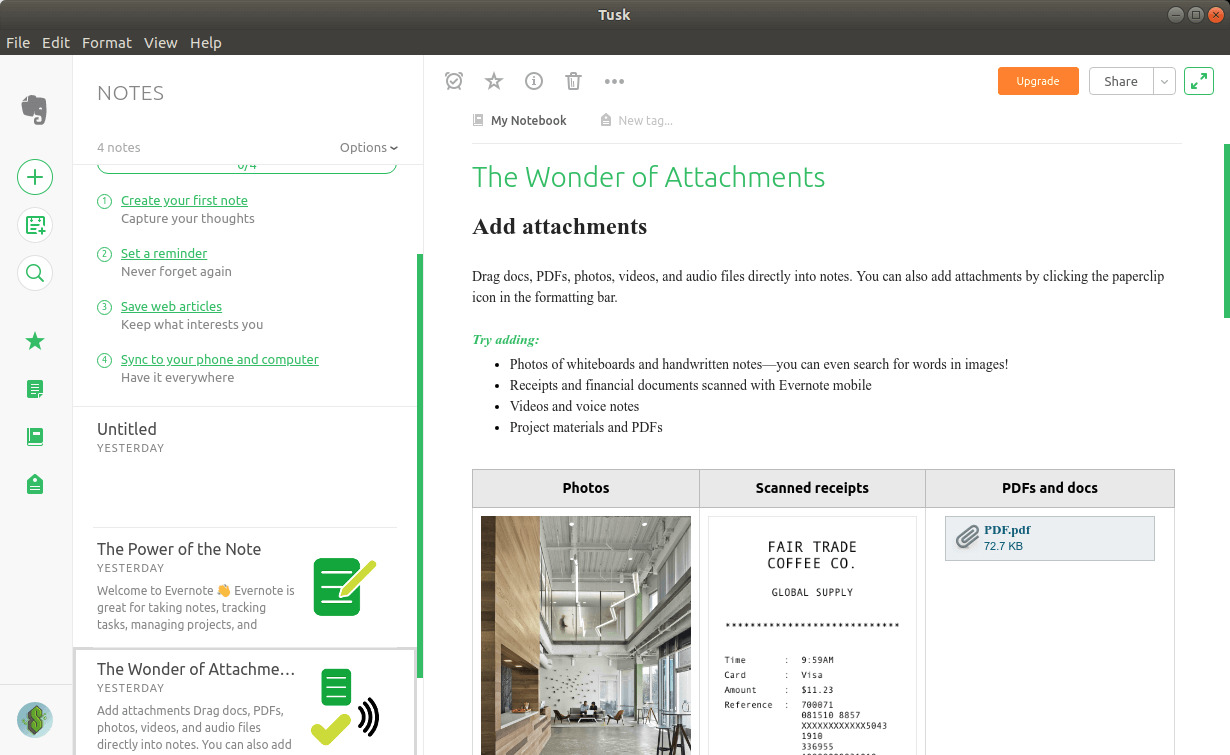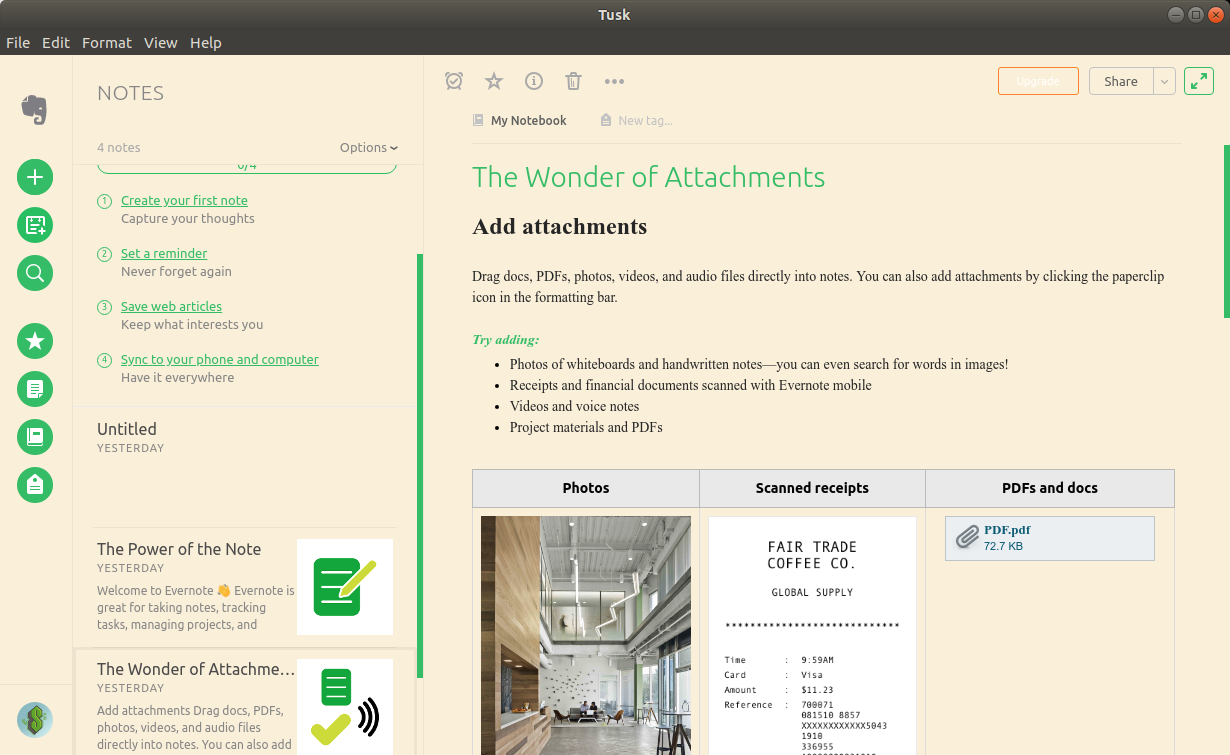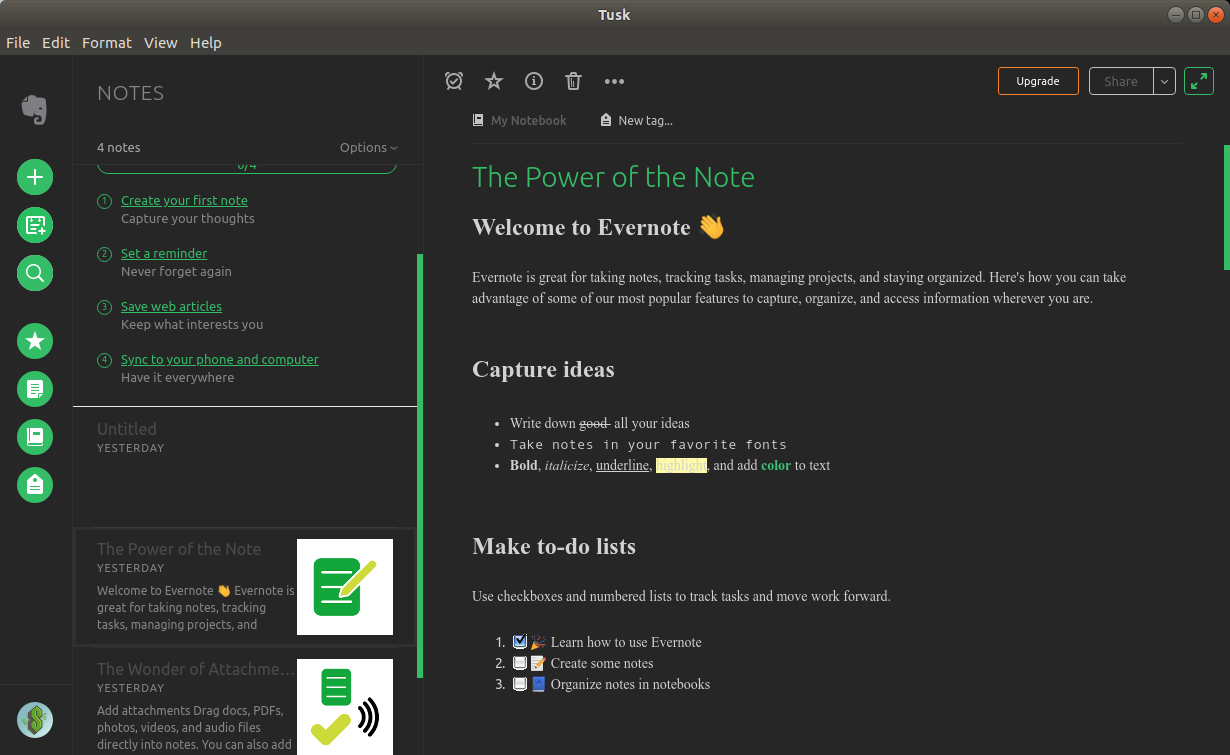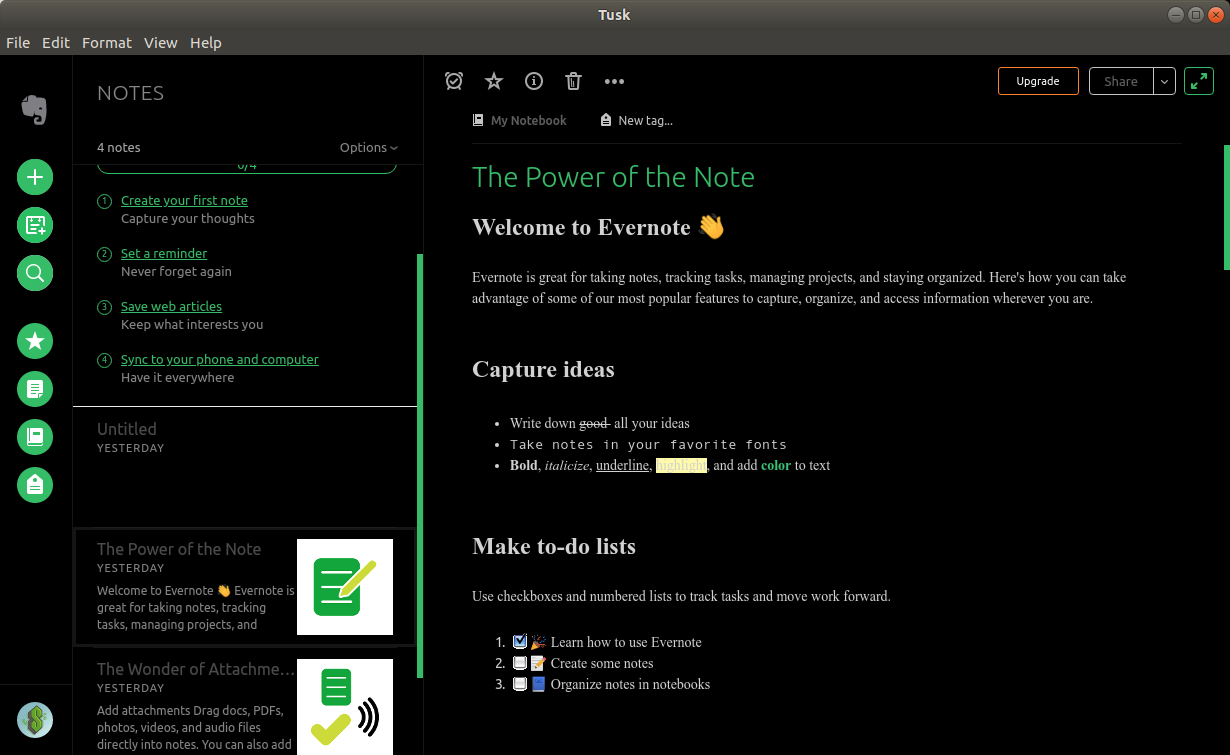Last Updated on December 24, 2022
In Operation
Here’s the initial startup of Tusk.

While the software offers black, dark, and sepia themes, themes would not initially activate. And both the search shortcut and menu action item for search didn’t open the search dialog. The issue lies with the version of Evernote. The latest version of Evernote is not supported by Tusk. The solution is simple – switch to the older version of Evernote.
Here’s the Sepia theme displayed using the older version of Evernote. It’s targeted at users with glossy screens. All my displays are matte, which have an anti-glare coating applied to them. I avoid displays with reflections at all costs.

And there’s the Dark Theme in action which the project bills as silky and relaxing. It’s definitely more relaxing on the eyes than the default or sepia theme.

And if you really want to look after your eyes, consider switching to the Black Theme.

The main reason that attracted me to Tusk is the huge array of customizable keyboard shortcuts, there’s more than 70 local keyboard shortcuts. It’s best to have a printout of these local shortcuts, as they take a bit of effort to learn. Or if you want, you can define your own custom shortcut keys. You can also access Tusk anytime in your system with its global shortcut keys, although these are not user-definable.
The more time spent on the keyboard rather than the mouse makes a real difference to my productivity. And the Focus mode helps in this department, removing a lot of the cruft in the interface, reducing distractions. Combine this with the full screen option, and I’m all set for creativity. And if you’ve got a display with a low resolution, the software caters for you with a compact mode.
Productivity is also boosted with excellent note navigation, and the drap and drop support.
Next page: Page 3 – Other Features
Pages in this article:
Page 1 – Introduction / Installation
Page 2 – In Operation
Page 3 – Other Features
Page 4 – Summary
Complete list of articles in this series:
| Excellent Utilities | |
|---|---|
| AES Crypt | Encrypt files using the Advanced Encryption Standard |
| Ananicy | Shell daemon created to manage processes’ IO and CPU priorities |
| broot | Next gen tree explorer and customizable launcher |
| Cerebro | Fast application launcher |
| cheat.sh | Community driven unified cheat sheet |
| CopyQ | Advanced clipboard manager |
| croc | Securely transfer files and folders from the command-line |
| Deskreen | Live streaming your desktop to a web browser |
| duf | Disk usage utility with more polished presentation than the classic df |
| eza | A turbo-charged alternative to the venerable ls command |
| Extension Manager | Browse, install and manage GNOME Shell Extensions |
| fd | Wonderful alternative to the venerable find |
| fkill | Kill processes quick and easy |
| fontpreview | Quickly search and preview fonts |
| horcrux | File splitter with encryption and redundancy |
| Kooha | Simple screen recorder |
| KOReader | Document viewer for a wide variety of file formats |
| Imagine | A simple yet effective image optimization tool |
| LanguageTool | Style and grammar checker for 30+ languages |
| Liquid Prompt | Adaptive prompt for Bash & Zsh |
| lnav | Advanced log file viewer for the small-scale; great for troubleshooting |
| lsd | Like exa, lsd is a turbo-charged alternative to ls |
| Mark Text | Simple and elegant Markdown editor |
| McFly | Navigate through your bash shell history |
| mdless | Formatted and highlighted view of Markdown files |
| navi | Interactive cheatsheet tool |
| noti | Monitors a command or process and triggers a notification |
| Nushell | Flexible cross-platform shell with a modern feel |
| nvitop | GPU process management for NVIDIA graphics cards |
| OCRmyPDF | Add OCR text layer to scanned PDFs |
| Oh My Zsh | Framework to manage your Zsh configuration |
| Paperwork | Designed to simplify the management of your paperwork |
| pastel | Generate, analyze, convert and manipulate colors |
| PDF Mix Tool | Perform common editing operations on PDF files |
| peco | Simple interactive filtering tool that's remarkably useful |
| ripgrep | Recursively search directories for a regex pattern |
| Rnote | Sketch and take handwritten notes |
| scrcpy | Display and control Android devices |
| Sticky | Simulates the traditional “sticky note” style stationery on your desktop |
| tldr | Simplified and community-driven man pages |
| tmux | A terminal multiplexer that offers a massive boost to your workflow |
| Tusk | An unofficial Evernote client with bags of potential |
| Ulauncher | Sublime application launcher |
| Watson | Track the time spent on projects |
| Whoogle Search | Self-hosted and privacy-focused metasearch engine |
| Zellij | Terminal workspace with batteries included |

Amazing Linux program I wrote this written the last year for my class project
I assume you are referring to a program you wrote rather than Tusk. Tusk’s first public release was back in August 2017. The project is written by Klaus Sinani, Mario Sinani and Athan Gkanos.
The project has seen almost no code commits in the past few years.